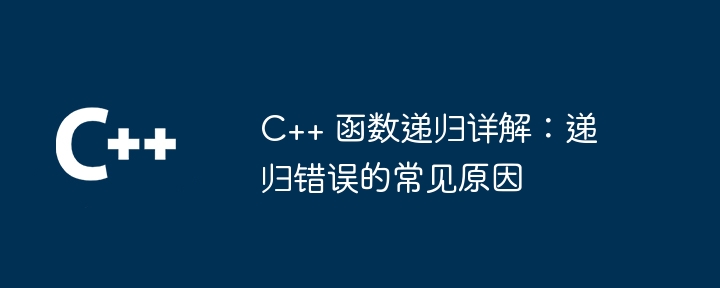Home >Backend Development >C++ >Detailed explanation of C++ function recursion: common causes of recursion errors
Detailed explanation of C++ function recursion: common causes of recursion errors
- 王林Original
- 2024-04-30 15:09:01512browse
Common errors with recursive functions include infinite recursion, which causes the function to call itself infinitely; stack overflow, which occurs when there are too many recursive calls; logic errors, where recursive functions may produce incorrect answers. In the actual case, recursive calculation of factorial is used, and the definition of factorial is used to transform the larger-scale factorial problem into a smaller-scale problem. Therefore, when using recursion, these errors should be avoided to ensure the correctness and efficiency of the function.

#C Detailed explanation of function recursion: Common causes of recursion errors
Recursion is a way for a function to call itself. In C, a recursive function is written by calling itself from a function. Recursion is useful for solving certain problems, but it can lead to errors if not written carefully.
Common causes of recursion errors:
- Infinite recursion: This is a recursive function calling itself without solving the problem, causing the function Calls itself infinitely. For example:
int factorial(int n) {
if (n > 1) {
return n * factorial(n - 1);
}
return 1;
}In this case, if you pass a negative number or 0, the function will recurse infinitely because the recursive call will not terminate.
- Stack overflow: When a recursive function calls itself too many times, it will cause a stack overflow. The stack is a data structure in which function call information is stored. The stack space is limited. If there are too many recursive calls, the stack will overflow. For example:
void print_numbers(int n) {
if (n > 0) {
print_numbers(n - 1);
std::cout << n << std::endl;
}
}This function has no exit condition when calling itself, thus causing a stack overflow.
- Logic errors: In some cases, recursive functions may cause logic errors. For example:
bool is_palindrome(std::string str) {
if (str.empty()) {
return true;
}
if (str[0] != str[str.length() - 1]) {
return false;
}
return is_palindrome(str.substr(1, str.length() - 2));
}This function is used to determine whether a string is a palindrome. However, if the string has an odd number of characters, the function will not return the correct answer.
Practical case: Calculating factorial
We use recursion to calculate factorial:
int factorial(int n) {
if (n <= 1) {
return 1;
}
return n * factorial(n - 1);
}With recursion, we only need to know the definition of factorial (n! = n * (n-1)!), you can finally solve the problem by continuously transforming the factorial problem into a smaller factorial problem.
Conclusion:
Recursion is a powerful tool, but care must be taken when writing recursive functions. Avoid infinite recursion, stack overflow, and logic errors to ensure that functions are correct and efficient.
The above is the detailed content of Detailed explanation of C++ function recursion: common causes of recursion errors. For more information, please follow other related articles on the PHP Chinese website!

